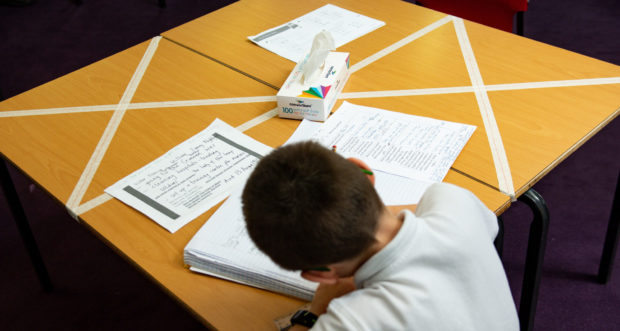Bananas are radioactive. Like most of what I know, I learned that fact in school and it’s proved entirely unhelpful in adult life.
I was however reminded of the phenomenon of background radiation in relation to what feels like a constant drip of coronavirus cases in Scottish schools.
Just as radiation is all around us but becomes a problem when it gets above certain levels, so we will have to accept that a rolling outbreak of Covid-19 is the price we pay for getting pupils back at their desks.
The Westminster government is currently going big on the issue of the return to school. As ever, the Downing Street messaging and the government’s London media chums are completely ignoring Scotland.
A weekend media blitz pointed up an announcement from all four UK chief medical officers declaring schools are safe. It would’ve been a bigger story had the Scottish CMO said otherwise given schools went back a fortnight ago.
What the UK administration is not doing is preparing its English audience for the inevitable outbreaks when schools go back.
Parents will query the disconnect between announcing classrooms are safe and then being told to quarantine somewhere down the line because the kid that flicked a bogey at their little darling is sent home with a constant cough. And if it’s not their own child affected on any given occasion, news coverage will give the impression that it could be them next. That’ll fuel anxiety on health and uncertainty over working and childcare arrangements.
For Boris Johnson and English Education Secretary Gavin Williamson it’ll leave them yet again looking inept on the twin issues of education and managing the pandemic. Their failings invariably come back to one lesson almost everyone has to learn at school. And it’s this vital lesson that makes it crucial kids get back to classrooms across the UK.
Yet due to upbringing and environment too many of the current Tory party have not understood it.
The lesson is this: You don’t get to choose who you deal with in life.
When schools closed and lockdown began I was delighted that modern technology meant my teenage daughter could keep in touch with friends. But as time has gone on it’s become clear that what she’s missing out on is mixing with non-friends. The bores and the bullies, the people you just don’t click with, people with different backgrounds and experiences. The sort of people who won’t become friends but will still be sitting in your classroom. Or in your office. Or in your train carriage. Or in the pub.
Learning maths is fine. The bigger lesson in school is seeing how other folk react to the challenge of algebra and appraising how you and they fit into the classroom dynamic. That’s preparing you for society.
But Boris Johnson was schooled at Eton, with limited opportunities to understand the experience of half the population given it’s an all-boys school. And the price and prestige inevitably leads to a lack of diversity in socio-economic background and outlook.
Research last week found 12 of the Cabinet attended a range of just two universities: Oxford and Cambridge. (There’s no Oxbridge graduates among SNP MPs. The possible reasons and implications of that are for another column).
At Eton, Oxbridge and in the Conservative party you do get to choose who you mix with. In Number 10 you don’t get to choose who you govern.
Surround yourself with like-minded ideologues, as this administration clearly has in taking the team that won the Brexit referendum into Downing Street, and you will be blindsided all too often.
The history of the Johnson premiership has demonstrated this. Whether it’s on coronavirus testing or school exams, the administration has faced many challenges and flunked each in turn.
Johnson’s Cabinet of stuffed shirts and fellow travellers keeps coming up short. The PM’s right-hand Dominic Cummings sent special advisers off on their summer holidays with instructions to read a book called Superforecasting. It’s about how experts are often rubbish at predicting the future but some people get it right. (In other words some chancers have spun an entire book out of the phrase “a stopped clock is right twice a day”).
Cummings and his colleagues are aiming too high. Never mind anything super, just a bit of forecasting would be in order, an ability to spot problems coming down the track and take preemptive action. That’s governing.
School pupils have been overlooked throughout the pandemic. From the shambolic decision to close schools, to patchy support for remote working and ultimately in the exams fiasco in all parts of the UK.
They need to be prioritised now. Sums and spelling are vital, but social skills are essential and they are learned at school. Without them kids are set up for a lifetime of failure.
James Millar is a political commentator and author and a former Westminster correspondent for The Sunday Post










